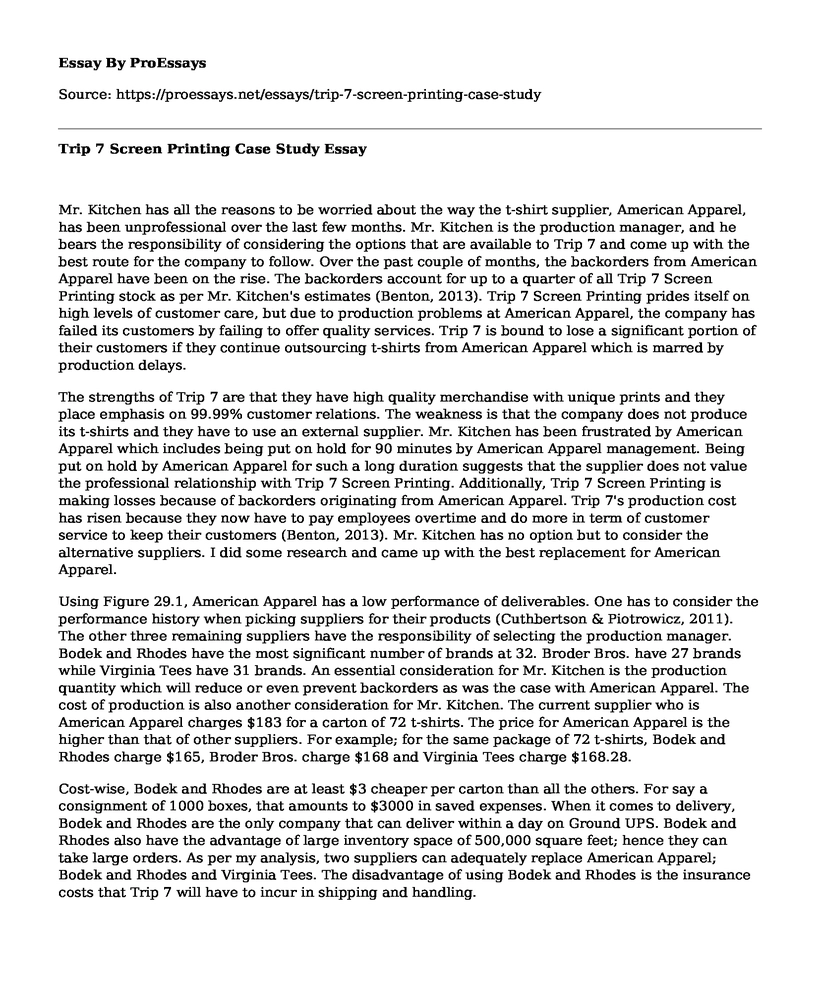Mr. Kitchen has all the reasons to be worried about the way the t-shirt supplier, American Apparel, has been unprofessional over the last few months. Mr. Kitchen is the production manager, and he bears the responsibility of considering the options that are available to Trip 7 and come up with the best route for the company to follow. Over the past couple of months, the backorders from American Apparel have been on the rise. The backorders account for up to a quarter of all Trip 7 Screen Printing stock as per Mr. Kitchen's estimates (Benton, 2013). Trip 7 Screen Printing prides itself on high levels of customer care, but due to production problems at American Apparel, the company has failed its customers by failing to offer quality services. Trip 7 is bound to lose a significant portion of their customers if they continue outsourcing t-shirts from American Apparel which is marred by production delays.
The strengths of Trip 7 are that they have high quality merchandise with unique prints and they place emphasis on 99.99% customer relations. The weakness is that the company does not produce its t-shirts and they have to use an external supplier. Mr. Kitchen has been frustrated by American Apparel which includes being put on hold for 90 minutes by American Apparel management. Being put on hold by American Apparel for such a long duration suggests that the supplier does not value the professional relationship with Trip 7 Screen Printing. Additionally, Trip 7 Screen Printing is making losses because of backorders originating from American Apparel. Trip 7's production cost has risen because they now have to pay employees overtime and do more in term of customer service to keep their customers (Benton, 2013). Mr. Kitchen has no option but to consider the alternative suppliers. I did some research and came up with the best replacement for American Apparel.
Using Figure 29.1, American Apparel has a low performance of deliverables. One has to consider the performance history when picking suppliers for their products (Cuthbertson & Piotrowicz, 2011). The other three remaining suppliers have the responsibility of selecting the production manager. Bodek and Rhodes have the most significant number of brands at 32. Broder Bros. have 27 brands while Virginia Tees have 31 brands. An essential consideration for Mr. Kitchen is the production quantity which will reduce or even prevent backorders as was the case with American Apparel. The cost of production is also another consideration for Mr. Kitchen. The current supplier who is American Apparel charges $183 for a carton of 72 t-shirts. The price for American Apparel is the higher than that of other suppliers. For example; for the same package of 72 t-shirts, Bodek and Rhodes charge $165, Broder Bros. charge $168 and Virginia Tees charge $168.28.
Cost-wise, Bodek and Rhodes are at least $3 cheaper per carton than all the others. For say a consignment of 1000 boxes, that amounts to $3000 in saved expenses. When it comes to delivery, Bodek and Rhodes are the only company that can deliver within a day on Ground UPS. Bodek and Rhodes also have the advantage of large inventory space of 500,000 square feet; hence they can take large orders. As per my analysis, two suppliers can adequately replace American Apparel; Bodek and Rhodes and Virginia Tees. The disadvantage of using Bodek and Rhodes is the insurance costs that Trip 7 will have to incur in shipping and handling.
Conclusion
On the other hand, Virginia Tees does not provide exclusive and private labels. For me, I would encourage Mr. Kitchen to pick Bodek and Rhodes. Insurance costs increase the amount of initial capital needed to kick off production, but with this supplier, Trip 7 is guaranteed a steady and abundant supply of t-shirts and in extension a potentially significant profit margin. To prevent future supply uncertainties, Trip 7 should sign a supply contract with Bodek and Rhodes, whose terms and conditions make the latter liable for breaching contract (Cuthbertson & Piotrowicz, 2011).
References
Benton, W. C. (2013). Purchasing and Supply Chain Management 3rd Ed. McGraw Hill.
Cuthbertson, R., & Piotrowicz, W. (2011). Performance measurement systems in supply chains: A framework for contextual analysis. International Journal of Productivity and Performance Management, 60(6), 583-602.
Cite this page
Trip 7 Screen Printing Case Study. (2022, Aug 04). Retrieved from https://proessays.net/essays/trip-7-screen-printing-case-study
If you are the original author of this essay and no longer wish to have it published on the ProEssays website, please click below to request its removal:
- Marketing Mix of Blackmores in Australia Local Market Paper Example
- Essay Sample on Sporting Risk Management Decisions
- Traits of Frederick Douglass' Leadership Essay
- Business Strategies for a Dynamic Market: Research Paper
- Essay Example on Organizational Structures: Achieving Objectives Effectively
- Essay Example on Company Consolidates Staff for Chain Store Success in USA
- Free Report Example on Apple: Essential HR Change Initiative for Maximizing Potential







